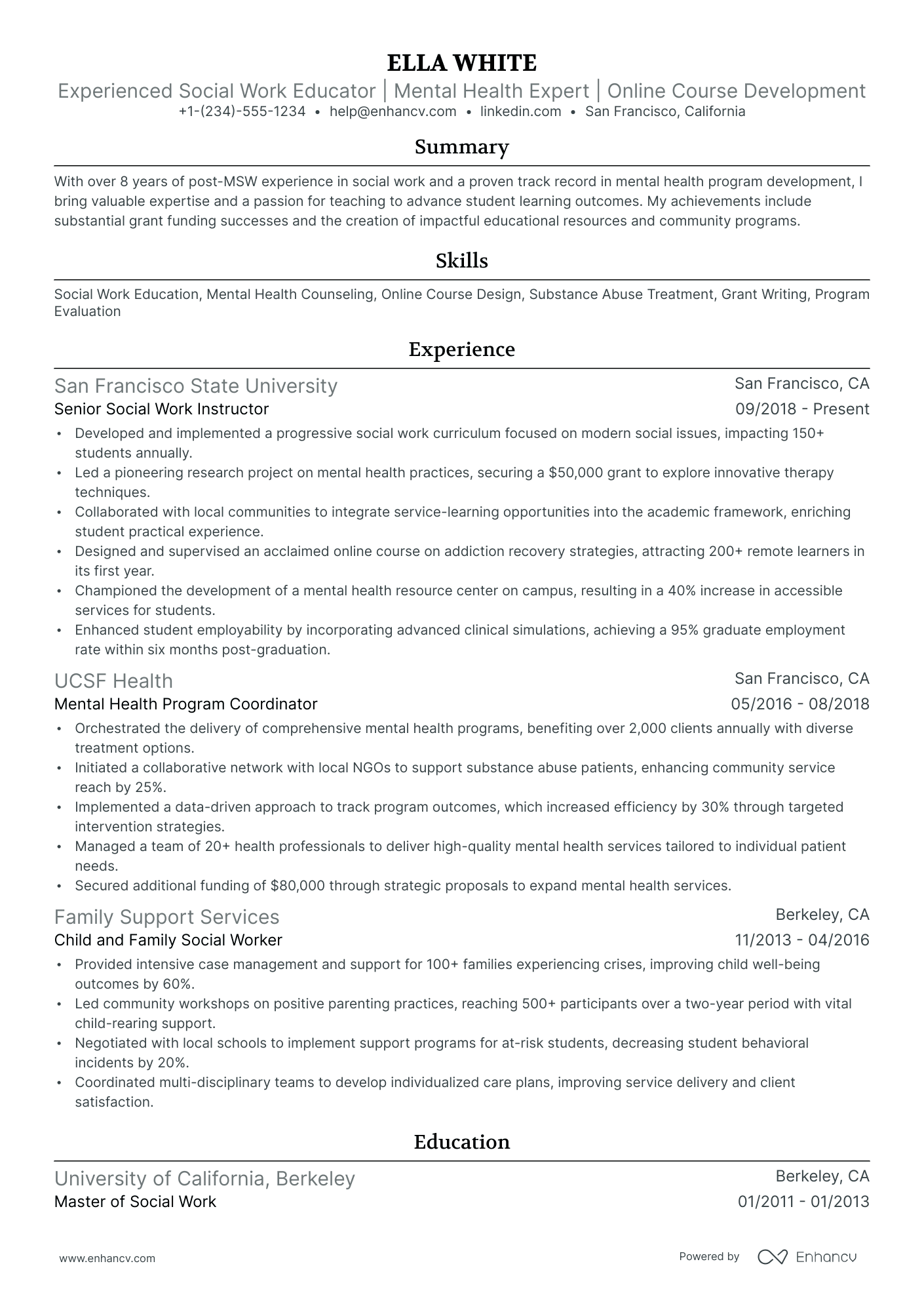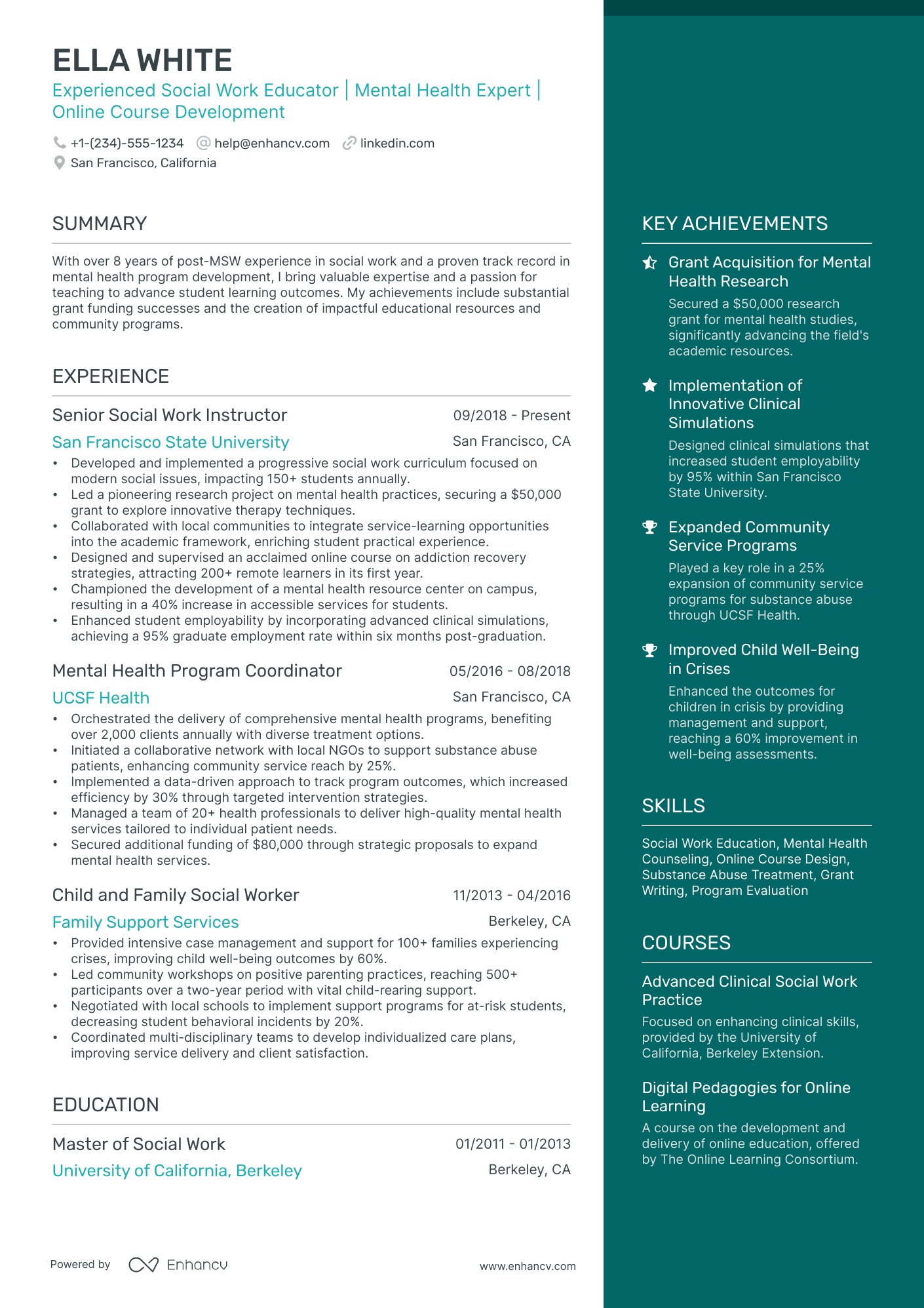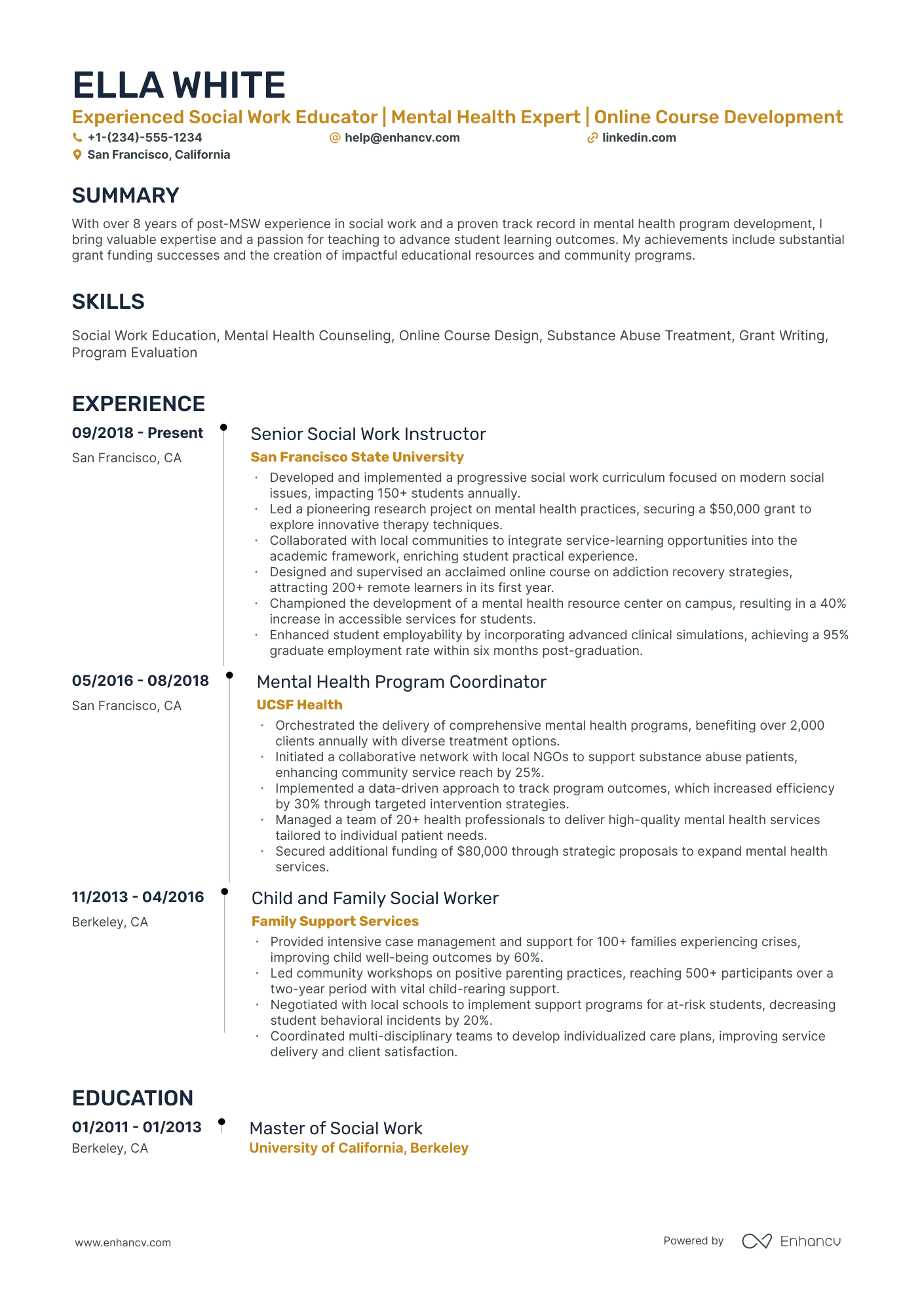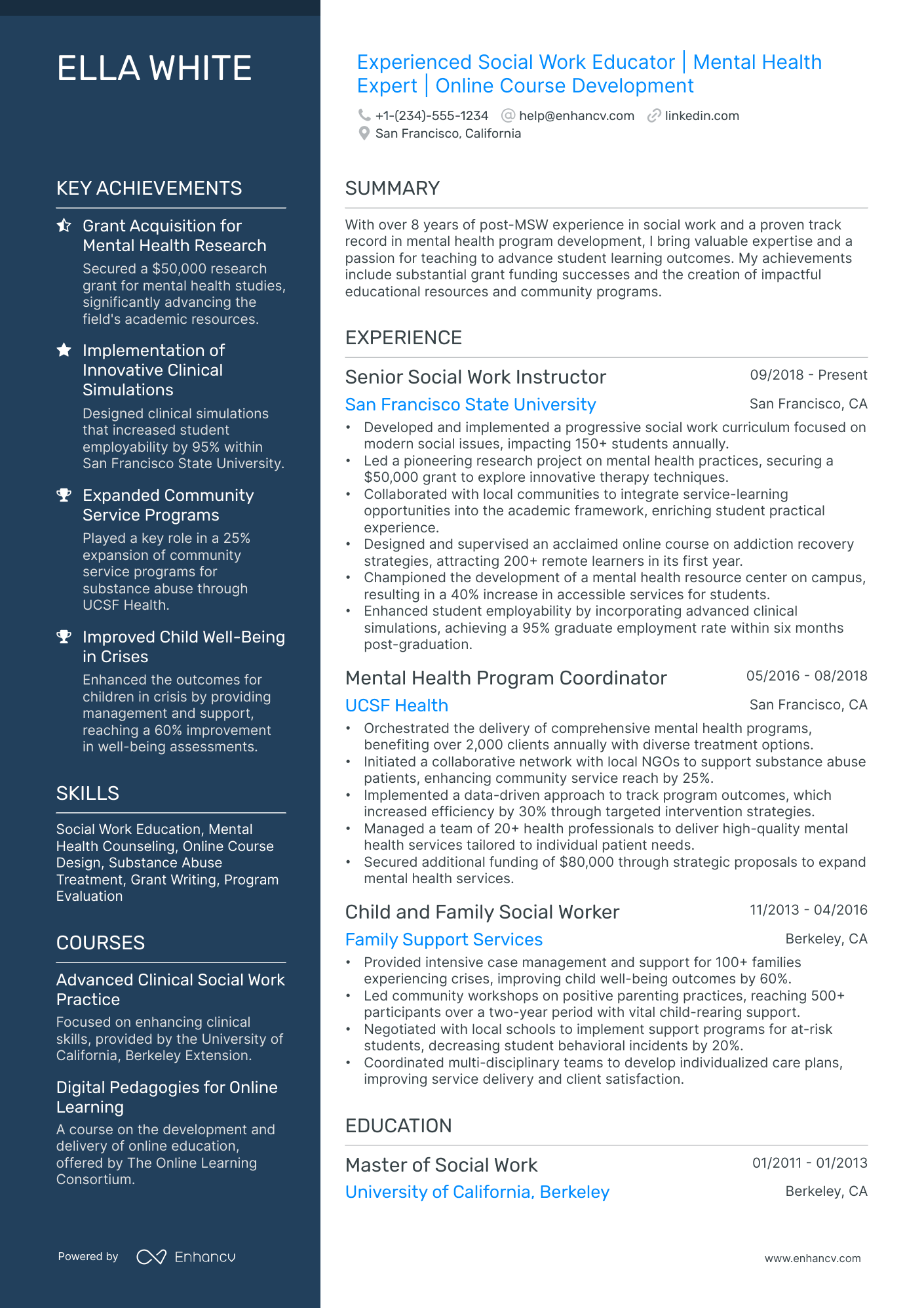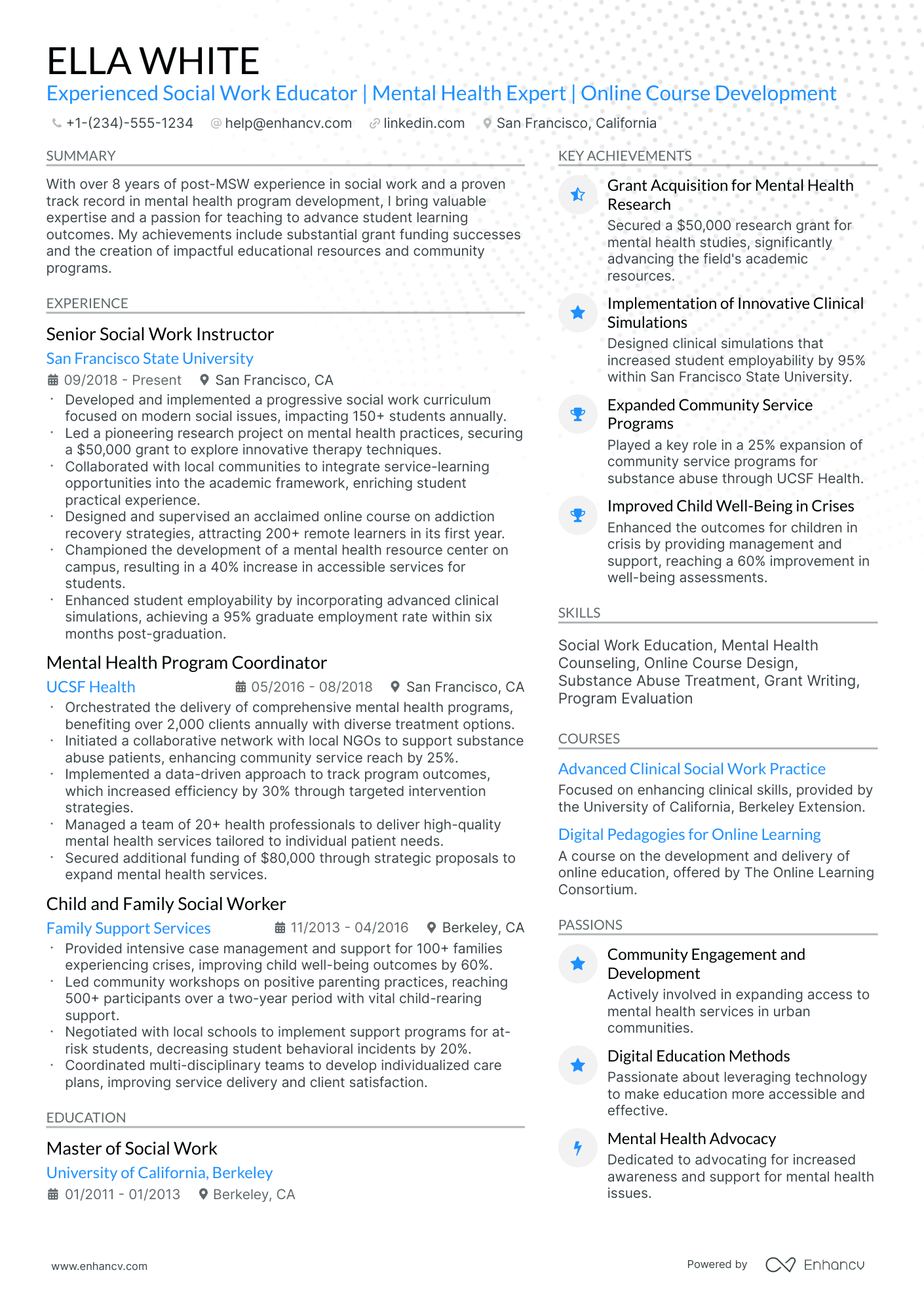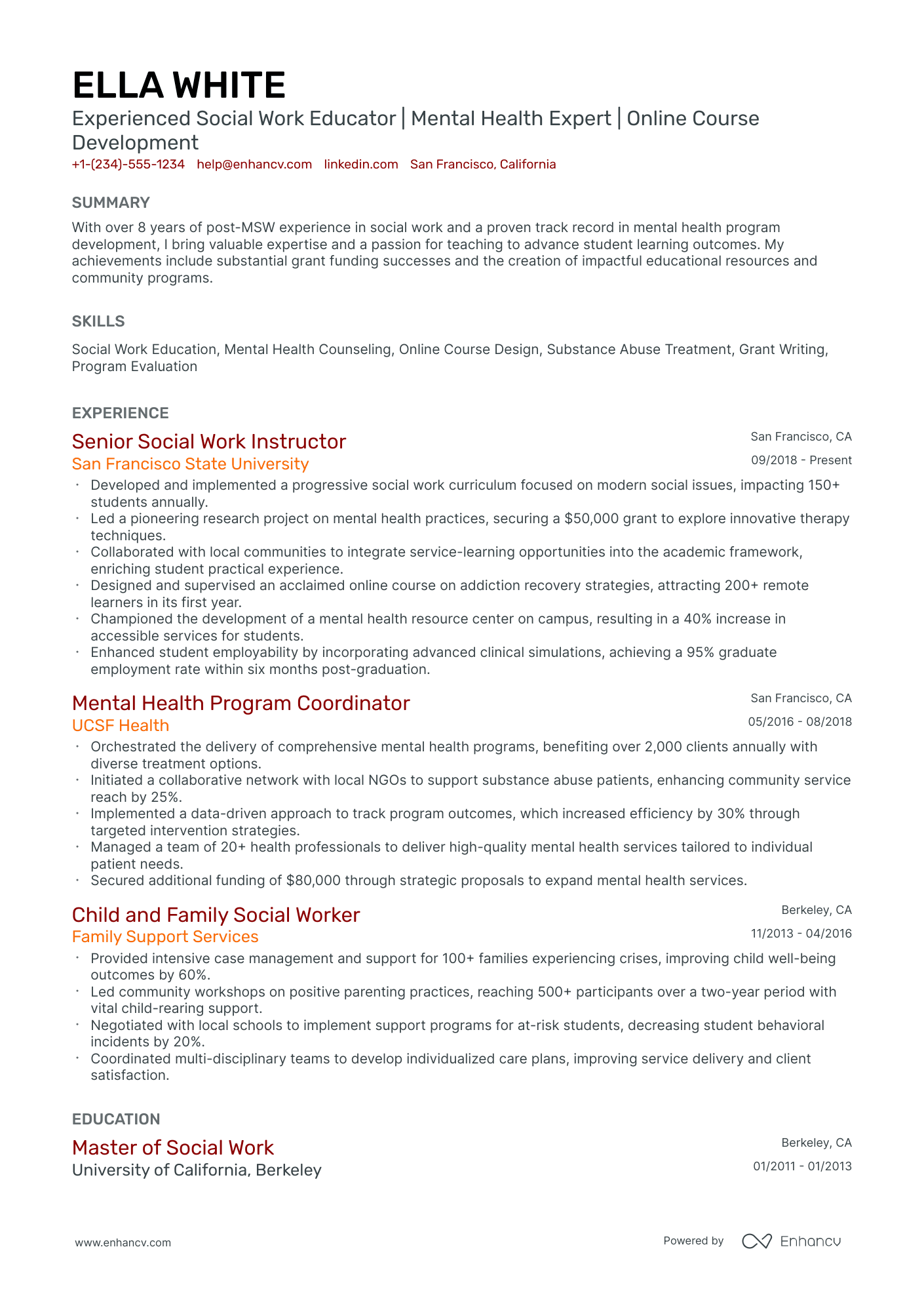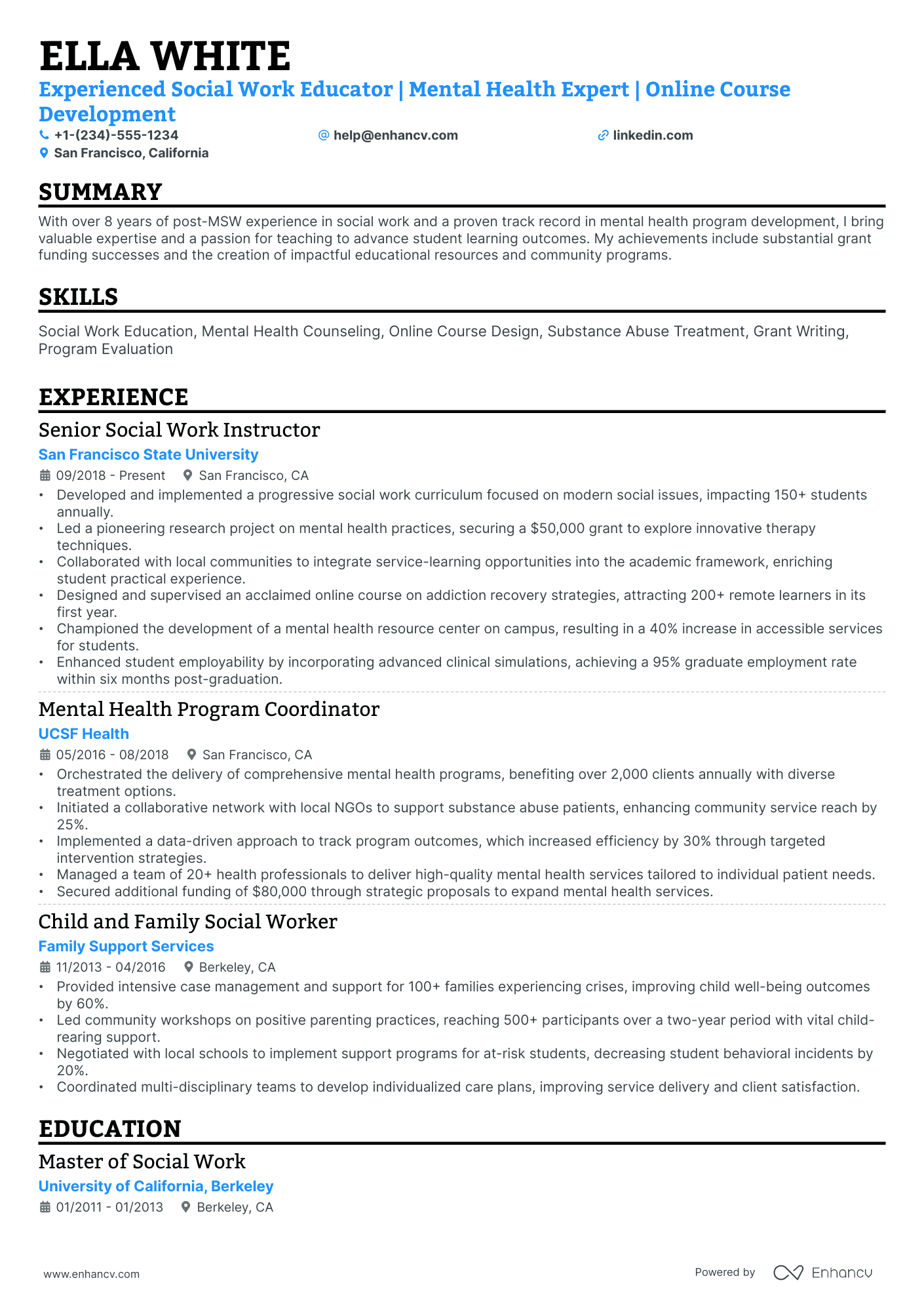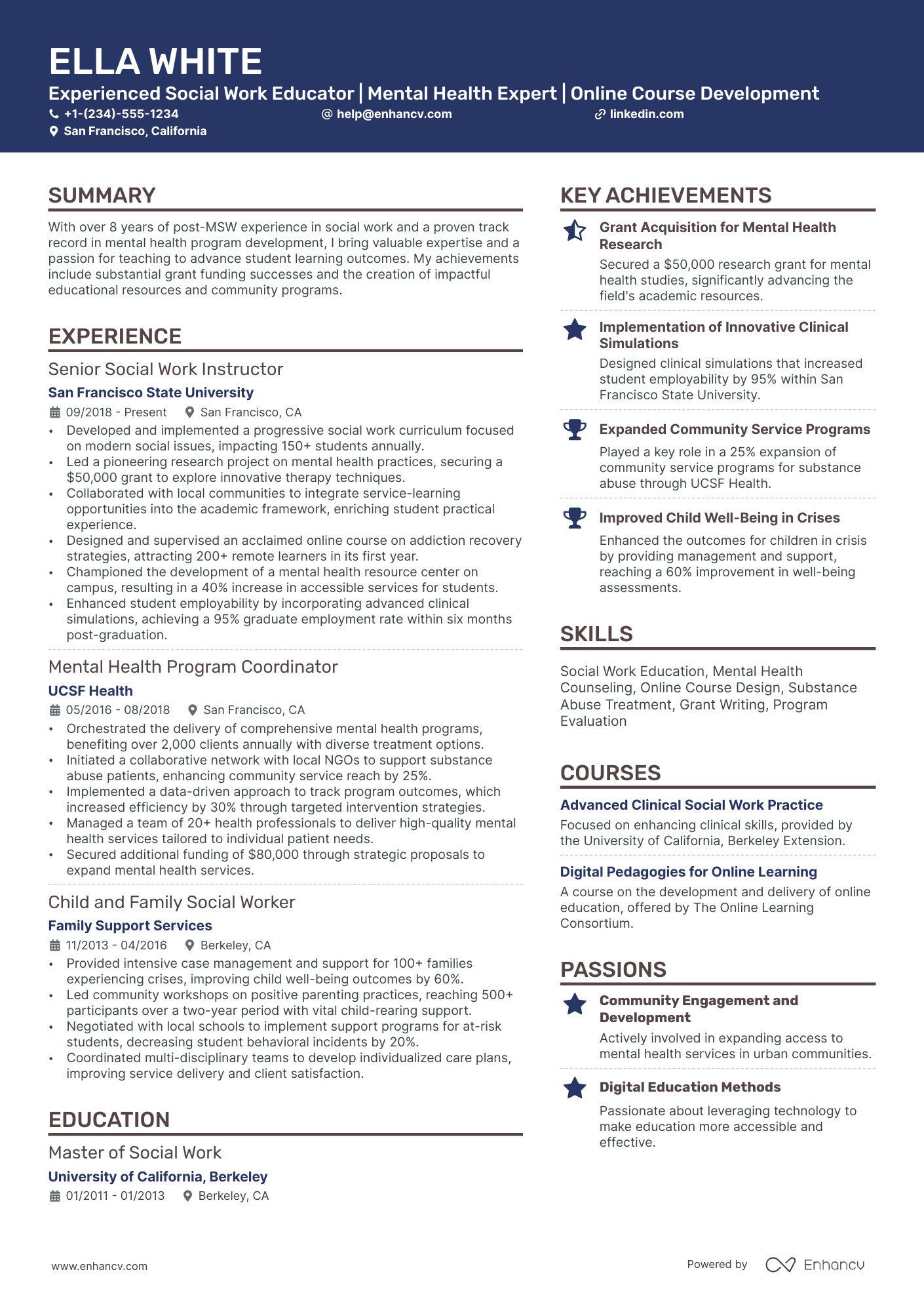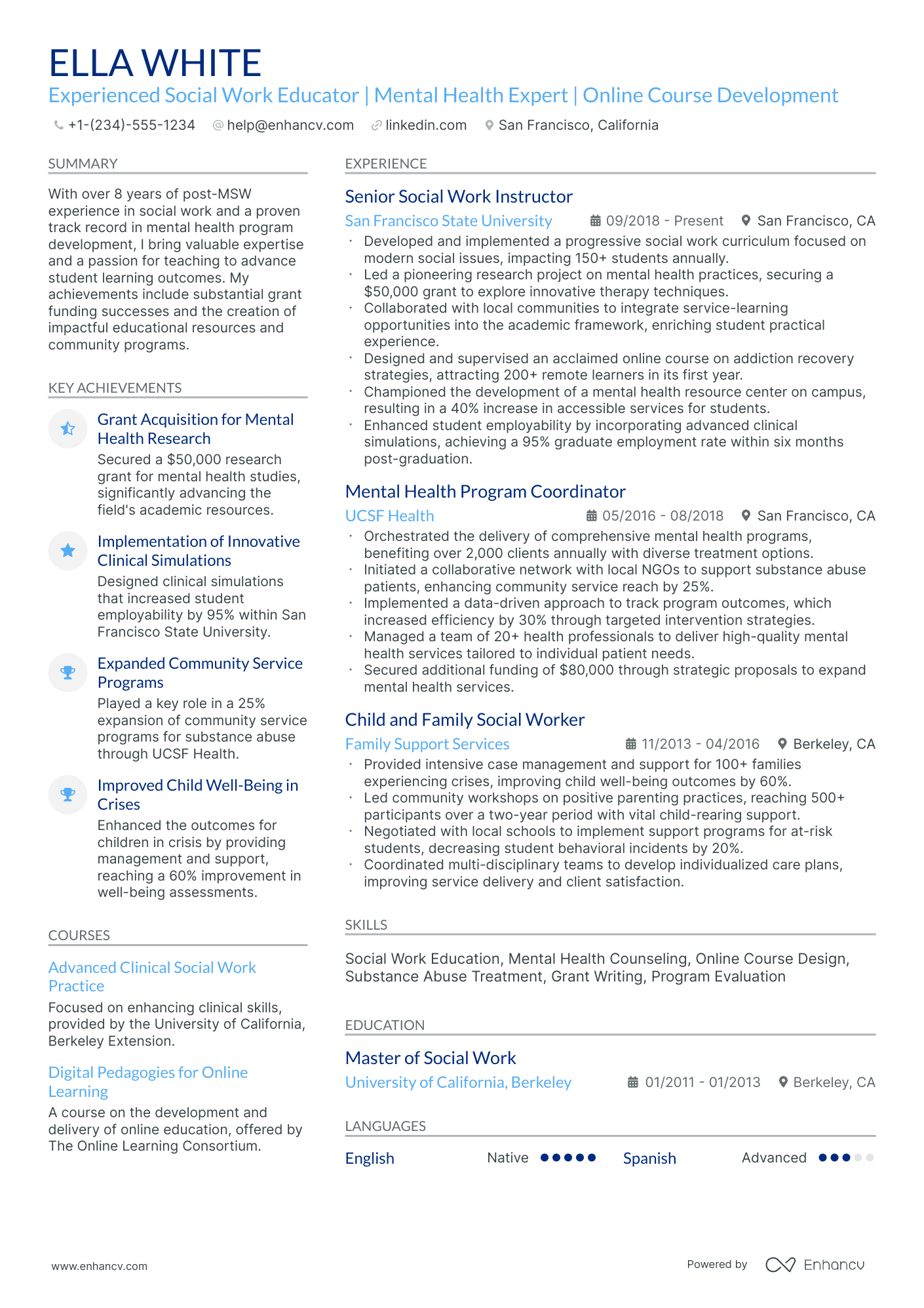As a lecturer, you might find it challenging to effectively showcase the full breadth of your teaching, research, and publication experience without your resume becoming overly lengthy or dense. Our guide offers tailored strategies to concisely present your academic achievements and make your resume stand out to hiring committees.
- Apply best practices from professional resumes to spotlight your application;
- Quantify your professional experience with achievements, career highlights, projects, and more;
- Write an eye-catching lecturer resume top one-third with your header, summary/objective, and skills section;
- Fill in the gaps of your experience with extracurricular, education, and more vital resume sections.
We've selected, especially for you, some of our most relevant lecturer resume guides. Getting you from thinking about your next career move to landing your dream job.
- Correctional Officer Resume Example
- Virtual Teacher Resume Example
- After School Teacher Resume Example
- Retired Teacher Resume Example
- Middle School Teacher Resume Example
- Educational Consultant Resume Example
- Sunday School Teacher Resume Example
- Lead Teacher Resume Example
- Theatre Teacher Resume Example
- Creative Art Teacher Resume Example
Is there a correct way to format your lecturer resume?
This is a tricky question. While skimming over your resume, recruiters will be looking at your experience and the message your profile conveys. That's why your resume format needs to be clear and concise, serving to supplement and organize your experience. Professional best practices point that the best lecturer resumes:
- Follow the reverse chronological order, where the most recent experience items are presented first . This is to keep your expertise succinct and to show recruiters your career growth over the years;
- Have a clearly defined header that includes all relevant contact information and a portfolio or a LinkedIn link. In some countries, it is acceptable to include a professional photo , so that your application is more memorable;
- Feature the most important lecturer resume sections towards the top, e.g. summary, skills, and experience. That way, recruiters can immediately find information that is relevant to the role;
- Take up no more than two pages - and two pages are the exception for more experienced professionals. Keep your expertise to the point and use your lecturer resume real estate wisely .
- Selecting modern, yet simple fonts, e.g. Rubik, Lato, etc., would help your application stand out;
- Many candidates stick with the tried-and-tested Arial or Times New Roman, but you'd want your lecturer resume to be a bit more unique;
- The ATS can read all serif and sans-serif fonts, so you should avoid fancy, formal script (or cursive) fonts.
Align your resume with the market’s standards – Canadian resumes may have unique layout guidelines.
Upload & Check Your Resume
Drop your resume here or choose a file. PDF & DOCX only. Max 2MB file size.
PRO TIP
The more time and effort you've put into obtaining the relevant certificate, the closer to the top it should be listed. This is especially important for more senior roles and if the company you're applying for is more forward-facing.
Traditional sections, appreciated by recruiters, for your lecturer resume:
- Clear and concise header with relevant links and contact details
- Summary or objective with precise snapshot of our career highlights and why you're a suitable candidate for the lecturer role
- Experience that goes into the nuts and bolts of your professional qualifications and success
- Skills section(-s) for more in-depth talent-alignment between job keywords and your own profile
- Education and certifications sections to further show your commitment for growth in the specific niche
What recruiters want to see on your resume:
- Educational Background: Highest degree obtained, relevant certifications, and areas of specialization.
- Teaching Experience: Previous teaching roles, courses taught, and any innovative teaching methods implemented.
- Research Proficiency: Published works, ongoing research projects, and any grants or fellowships awarded.
- Subject Matter Expertise: In-depth knowledge of the specific subject area being taught.
- Communication Skills: Evidence of exceptional oral and written communication skills, including presentations at conferences and guest lectures.
The lecturer resume experience section: a roadmap to your expertise
The resume experience section provides you with an opportunity to tell your professional narrative.
Recruiters, reading between the lines of your resume, use the experience section to better understand your unique skill set, accomplishments, and what unique value you bring about.
Discover five quick steps on how to write your experience section:
- Curate only relevant experience items to the role and include the company, description, and dates; all followed by up to six bullets per experience item;
- Each experience item should feature tangible results of your actions - if you can include a number or percent, this will further highlight your aptitude;
- If you've received any managerial or customer feedback, use short excerpts of it as further social proof of your technical or people skills;
- Make sure you're using the appropriate verb tense when listing your responsibilities;
- Within the description for each role, you could summarize your most noteworthy and relevant achievements.
Now, take note of how a real-world lecturer professional received opportunities at industry leaders with these resume experience sections:
- Developed and taught a comprehensive curriculum in Macroeconomics, consistently receiving student satisfaction rates above 90% over 5 semesters.
- Led a team of junior lecturers in a departmental initiative to integrate technology in the classroom, increasing student engagement by 25%.
- Authored and published three papers in peer-reviewed journals on economic theory, contributing to the department's research recognition nationally.
- Spearheaded a cutting-edge research project on artificial intelligence that secured $500,000 in funding and was featured at an international conference.
- Supervised doctoral candidates, one of whom won a prestigious award for their dissertation on machine learning algorithms.
- Collaborated with industry leaders to redesign the computer science curriculum, resulting in a 40% increase in departmental job placement rates after graduation.
- Initiated and coordinated a multi-disciplinary field research project that contributed notable findings on local wildlife conservation efforts.
- Led workshops on advanced biotechnological methods for undergraduate students, receiving a faculty award for innovative teaching methods.
- Cultivated partnerships with local environmental organizations to provide students with real-world experience, thus enhancing their practical skills.
- Introduced a new applied mathematics symposium to the annual department event calendar, attracting over 1000 participants in the first year.
- Mentored a team of students in a national mathematics competition, leading to a second-place finish among fifty university teams.
- Dramatically improved student retention in Calculus courses by implementing active learning strategies and ongoing assessment techniques.
- Organized an international workshop on quantum computing that brought together leading scientists and students, fostering cross-institutional collaborations.
- Created and successfully ran an online course in advanced quantum mechanics, enrolling over 2000 students globally and earning a top-rated course award.
- Developed a partnership with a technology firm for a research project on quantum sensors, providing students with industry experience and potential job placements.
- Pioneered an experiential learning project that connected students with local businesses to develop real-world marketing solutions, increasing collaboration by 30%.
- Successfully integrated social media analytics into the curriculum, improving students' readiness for digital marketing roles in a rapidly changing landscape.
- Advised the student marketing association, guiding members to win a regional competition against 20 universities through effective campaign strategies.
- Designed and conducted simulation exercises on global diplomacy, culminating in increased student understanding of international policy development.
- Forged a partnership with a foreign university that led to a successful student exchange program, broadening the international perspective of participants.
- Coordinated a lecture series on current global issues, bringing in ambassadors and global thinkers to spark critical discourse among students.
- Launched an annual startup incubator program that enabled student entrepreneurs to develop and pitch their business ideas to potential investors.
- Facilitated a collaborative learning environment which saw an increase in patent submissions by students by 20% within a year.
- Formed a strategic alliance with local business accelerators to give students hands-on experience in bringing innovative products to market.
The following content includes information from "O*NET OnLine" by the U.S. Department of Labor, Employment and Training Administration (USDOL/ETA). Used under the CC BY 4.0 license. The data represents the top responsibilities present on the task lists for lecturer professionals.
Top Responsibilities for Lecturer:
- Evaluate and grade students' class work, assignments, and papers.
- Initiate, facilitate, and moderate classroom discussions.
- Prepare course materials, such as syllabi, homework assignments, and handouts.
- Keep abreast of developments in the field by reading current literature, talking with colleagues, and participating in professional organizations and conferences.
- Plan, evaluate, and revise curricula, course content, and course materials and methods of instruction.
- Maintain student attendance records, grades, and other required records.
- Conduct research in a particular field of knowledge and publish findings in professional journals, books, or electronic media.
- Compile, administer, and grade examinations, or assign this work to others.
- Maintain regularly scheduled office hours to advise and assist students.
- Collaborate with colleagues to address teaching and research issues.
Quantifying impact on your resume
- Include the number of courses taught and the variety of subjects covered to demonstrate the breadth of your knowledge and teaching capabilities.
- List the total number of students you have instructed to showcase your experience in managing large groups and influencing a significant population of learners.
- Quantify the improvement in student grades or test scores under your instruction to highlight the effectiveness of your teaching methods.
- Mention the percentage increase in class attendance or enrollment in your courses to reflect your ability to engage and retain students.
- Detail any research grants received, specifying the amount and purpose, to underline your ability to secure funding and contribute to academic advancement.
- State the number of published papers, books, or articles you have authored to establish your academic impact and thought leadership.
- Indicate the number of thesis or dissertation committees you have participated in to show your role in mentoring and shaping future professionals.
- Describe any administrative roles held and related achievements, using figures to quantify your contribution to the institution's success and governance.
Action verbs for your lecturer resume
What to do if you don't have any experience
It's quite often that candidates without relevant work experience apply for a more entry-level role - and they end up getting hired.
Candidate resumes without experience have these four elements in common:
- Instead of listing their experience in reverse-chronological format (starting with the latest), they've selected a functional-skill-based format. In that way, lecturer resumes become more focused on strengths and skills
- Transferrable skills - or ones obtained thanks to work and life experience - have become the core of the resume
- Within the objective, you'd find career achievements, the reason behind the application, and the unique value the candidate brings about to the specific role
- Candidate skills are selected to cover basic requirements, but also show any niche expertise.
Recommended reads:
PRO TIP
The more trusted the organization you've attained your certificate (or degree) from, the more credible your skill set would be.
The heart and soul of your lecturer resume: hard skills and soft skills
If you read between the lines of the lecturer role you're applying for, you'll discover that all requirements are linked with candidates' hard skills and soft skills.
What do those skills have to do with your application?
Hard or technical skills are the ones that hint at your aptitude with particular technologies. They are easy to quantify via your professional experience or various certifications.
Meanwhile, your soft skills are more difficult to assess as they are personality traits, you've gained thanks to working in different environments/teams/organizations.
Your lecturer resume skills section is the perfect opportunity to shine a light on both types of skills by:
- Dedicating a technical skills section to list up to six technologies you're apt at.
- Focusing a strengths section on your achievements, thanks to using particular people skills or technologies.
- Including a healthy balance of hard and soft skills in the skills section to answer key job requirements.
- Creating a language skills section with your proficiency level - to hint at an abundance of soft skills you've obtained, thanks to your dedication to learning a particular language.
Within the next section of this guide, stay tuned for some of the most trending hard skills and soft skills across the industry.
Top skills for your lecturer resume:
Learning Management Systems (LMS)
Microsoft Office Suite
Presentation Software (e.g., PowerPoint)
Online Collaboration Tools (e.g., Google Workspace)
Video Conferencing Tools (e.g., Zoom, Microsoft Teams)
Plagiarism Detection Software
Research Databases (e.g., JSTOR, PubMed)
Educational Technology Tools (e.g., Kahoot, Quizlet)
Statistical Analysis Software (e.g., SPSS, R)
Content Management Systems (e.g., WordPress)
Communication
Time Management
Critical Thinking
Adaptability
Empathy
Teamwork
Conflict Resolution
Public Speaking
Creativity
Leadership
Next, you will find information on the top technologies for lecturer professonals from "O*NET OnLine" by the U.S. Department of Labor, Employment and Training Administration (USDOL/ETA). Used under the CC BY 4.0 license.
Top technologies for Lecturer’s resume:
- Email software
- Microsoft Outlook
- Blackboard software
- Schoology
- Google Docs
- Microsoft Word
PRO TIP
If you're in the process of obtaining your certificate or degree, list the expected date you're supposed to graduate or be certified.
Qualifying your relevant certifications and education on your lecturer resume
In recent times, employers have started to favor more and more candidates who have the "right" skill alignment, instead of the "right" education.
But this doesn't mean that recruiters don't care about your certifications .
Dedicate some space on your resume to list degrees and certificates by:
- Including start and end dates to show your time dedication to the industry
- Adding credibility with the institutions' names
- Prioritizing your latest certificates towards the top, hinting at the fact that you're always staying on top of innovations
- If you decide on providing further information, focus on the actual outcomes of your education: the skills you've obtained
If you happen to have a degree or certificate that is irrelevant to the job, you may leave it out.
Some of the most popular certificates for your resume include:
The top 5 certifications for your lecturer resume:
- Certificate of Higher Education (CertHE) - by various universities and higher education institutions
- Postgraduate Certificate in Higher Education (PGCertHE) - by various universities
- Postgraduate Certificate in Education (PGCE) - by various universities and teacher training institutions
- Advanced Certificate in Teaching English to Speakers of Other Languages (CELTA) - by Cambridge Assessment English
- Fellowship of the Higher Education Academy (FHEA) - by Advance HE
The content below includes information from "O*NET OnLine" by the U.S. Department of Labor, Employment and Training Administration (USDOL/ETA). Used under the CC BY 4.0 license. The data represents the top associations for lecturer professionals.
Top US associations for a Lecturer professional
- Academy of International Business
- Academy of Management
- Accreditation Council for Business Schools and Programs
- AICPA and CIMA
- American Accounting Association
PRO TIP
If you failed to obtain one of the certificates, as listed in the requirements, but decide to include it on your resume, make sure to include a note somewhere that you have the "relevant training, but are planning to re-take the exams". Support this statement with the actual date you're planning to be re-examined. Always be honest on your resume.
Recommended reads:
Professional summary or objective for your lecturer resume
lecturer candidates sometimes get confused between the difference of a resume summary and a resume objective.
Which one should you be using?
Remember that the:
- Resume objective has more to do with your dreams and goals for your career. Within it, you have the opportunity to showcase to recruiters why your application is an important one and, at the same time, help them imagine what your impact on the role, team, and company would be.
- Resume summary should recount key achievements, tailored for the role, through your career. Allowing recruiters to quickly scan and understand the breadth of your lecturer expertise.
The resume objectives are always an excellent choice for candidates starting off their career, while the resume summary is more fitting for experienced candidates.
No matter if you chose a summary or objective, get some extra inspiration from real-world professional lecturer resumes:
Resume summaries for a lecturer job
- Seasoned Psychology lecturer with over 10 years of experience at notable universities, adept in curriculum development and delivering engaging lectures. Proven track record in initiating mental health workshops, which increased student counseling engagement by 30%.
- Dynamic Computer Science lecturer, boasting 12 years of imparting advanced programming knowledge at a top tech institute. Led the department in transitioning to an improved hands-on coding curriculum, contributing to a 40% rise in graduate employability.
- Highly motivated former industry expert with 15 years in data analytics, seeking to transition into academia to share practical insights in Information Systems. Spearheaded a multinational company's data restructure, increasing data processing efficiency by 50%.
- Accomplished professional biotechnologist eager to leverage 20 years of experience in pharmaceutical research in a Biology lecturer role. Instrumental in developing a groundbreaking vaccine that decreased disease spread in trials by 60%.
- Eager to bring a fresh perspective to academic teaching with a background in entrepreneurial leadership, aiming to inspire the next generation of business innovators while promoting a real-world application of enterprise and management principles.
- Aspiring to introduce inventive theoretical concepts and foster critical thinking in students through a Mathematics lecturer position, capitalizing on a robust background in financial analysis and passion for applied statistics.
Optimize your resume summary and objective for ATS
Drop your resume here or choose a file.
PDF & DOCX only. Max 2MB file size.
Average salary info by state in the US for lecturer professionals
Local salary info for Lecturer.” Source: My Next Move, National Center for O*NET Development. Accessed 10/15/2024
| State | Average Salary (in USD) |
|---|---|
| US National Average | $97,130 |
| California (CA) | $107,750 |
| Texas (TX) | $99,610 |
| Florida (FL) | $69,940 |
| New York (NY) | $111,680 |
| Pennsylvania (PA) | $93,160 |
| Illinois (IL) | $92,890 |
| Ohio (OH) | $81,500 |
| Georgia (GA) | $78,200 |
| North Carolina (NC) | $76,820 |
| Michigan (MI) | $100,710 |
Four more sections for your lecturer resume
Your lecturer resume can be supplemented with other sections to highlight both your personality and efforts in the industry. Use the ones you deem most relevant to your experience (and the role):
- Awards - to celebrate your success;
- Interests - to detail what you're passionate about outside of work (e.g. music, literature, etc.);
- Publications - to show your footprint in the wider community;
- Projects - to pinpoint noteworthy achievements, potentially even outside of work.
Key takeaways
We've reached the end of our lecturer resume guide and hope this information has been useful. As a summary of our key points:
- Always assess the job advert for relevant requirements and integrate those buzzwords across various sections of your lecturer resume by presenting tangible metrics of success;
- Quantify your hard skills in your certificates and skills section, while your soft skills in your resume achievements section;
- Ensure you've added additional relevant experience items, such as extracurricular activities and projects you've participated in or led;
- Use both your resume experience and summary to focus on what matters the most to the role: including your technical, character, and cultural fit for the company.
